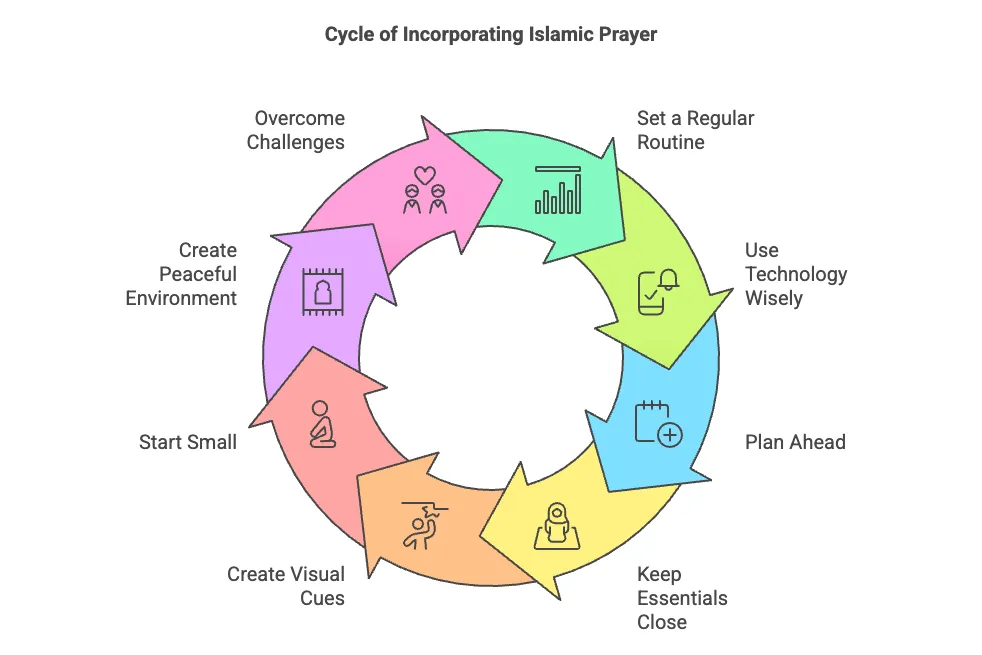
Easy Guide to Making Islamic Prayer a Daily Habit
Introduction
Praying is an important part of being a Muslim. It helps connect us with our faith and with Allah. Performing these sincere acts five times a day is a practice rooted deeply in Islamic tradition. For new Muslims, or those returning to faith, establishing a consistent prayer routine can seem like a challenge. But once you make prayer a habit, it becomes a regular part of your day.
One of the great things about making prayer a habit is that it brings about a sense of peace, focus, and discipline. With a little effort, prayer can fit into your daily routine, much like eating or sleeping. Building this habit will not only deepen your connection to your faith but also bring about personal peace and fulfillment.
In this guide, we'll explore simple and effective ways to incorporate daily prayer into your life. We’ll discuss strategies for fitting prayer into your schedule, creating the right environment, and overcoming any challenges you might face along the way. Whether you are new to Islam or have been practicing for years, these tips will help you strengthen your connection to this beautiful faith.
Understanding the Importance of Islamic Prayer
Prayer, or Salah, is a core pillar of Islam. It allows us to communicate directly with Allah. Salah helps us remember our place in the world and brings us closer to our faith. This practice is designed to nurture our spiritual lives, providing a sense of discipline and order. Each prayer time, from Fajr at dawn to Isha before sleep, reminds us of Allah’s presence and guidance throughout our day.
Praying regularly has numerous benefits. It establishes structure in our routine, improves discipline, and reduces stress by allowing moments to pause and reflect. Through prayer, we gain spiritual strength, which aids us in facing life's challenges. When we kneel in prayer, it isn’t just a gesture; it’s a declaration of our faith and a chance to seek guidance and forgiveness. Our minds and hearts are purified, enabling us to carry a sense of peace and purpose everywhere we go.
Steps to Incorporate Prayer into Your Daily Schedule
Making prayer a part of your daily routine does not have to be difficult. Here are practical strategies to ensure you include prayer seamlessly:
1. Set a Regular Routine: Link prayer times with daily activities like meals or waking up. This helps remember and makes it a habit.
2. Use Technology Wisely: Set reminders or alarms on your phone for each prayer. There are many apps that can notify you of prayer times based on your location.
3. Plan Ahead: Allocate specific times for Salah in your calendar, just like meetings or appointments. When you schedule it, you’re less likely to forget.
4. Keep Prayer Essentials Close: Have your prayer mat and attire easily accessible. This reduces excuses for missing prayer due to lack of preparation
5. Create Visual Cues: Place visible reminders in your surroundings. This can be a note or a quote that inspires you to pray.
6. Start Small: If creating a full routine feels heavy, start with one prayer and gradually increase. Allow yourself to practice and integrate each session into your daily life.
By planning and setting reminders, we ensure prayer becomes a fulfilling and consistent part of our day. Making these small changes leads to great improvements in spiritual growth and overall well-being.
Creating a Peaceful Prayer Environment
Having a dedicated space for prayers can enhance concentration and devotion. Choose an area in your home where you feel comfortable and away from distractions. It doesn’t need to be large, just enough for your prayer mat. Ensure this space is clean, as cleanliness is a significant part of preparation for Salah. Keep your Quran and any prayer books handy for ease of access.
Maintaining focus during prayer can be tricky. To minimize distractions, switch off mobile devices or leave them out of your prayer space. Inform family members of your prayer times, so they know to avoid interrupting you.
If noise is a problem, consider using earplugs or find a quieter time of day to pray. These small efforts can significantly improve your prayer experience, allowing for a more meaningful connection.
Overcoming Challenges and Building Consistency
Praying regularly can be challenging, especially with a busy lifestyle. Common obstacles include time management, forgetfulness, and lack of motivation. To tackle these, start by reassessing your schedule. Find moments in your day that can be dedicated to prayer, just like any priority task.
Consistency is key, and setting achievable goals helps. Begin with aiming to pray one or two times a day, gradually increasing as it becomes a natural part of your routine. If you miss a prayer, don't be discouraged; learn from it and adjust your approach. It’s important to remember that perseverance is vital to developing any new habit.
Reaching out for community support can be incredibly helpful. Attend mosque events or connect with fellow Muslims for encouragement and prayer reminders. Surrounding yourself with a supportive community boosts motivation and provides new insights on maintaining your religious practices. Seeking advice from more experienced Muslims provides guidance and makes challenges easier to overcome.
Your Easy Guide to Incorporating Islamic Prayer into Your Daily Routine
Making Islamic prayer a daily habit is a rewarding journey that enriches your spiritual life. It strengthens your relationship with Allah, providing peace and purpose in everyday life. Establishing a routine and creating a peaceful environment helps in achieving this goal. Overcoming challenges becomes easier with perseverance and community support.
At iERA Australia, we're here to support you on this journey. Our resources aim to help you deepen your understanding of Islam and create fulfilling spiritual practices. Explore our programs and join a community striving for spiritual growth.
Visit iERA Australia to discover more about how our Quran Reading Course Level Zero can help guide you in your faith!